April 18, 2025 | 13:55 GMT +7
April 18, 2025 | 13:55 GMT +7
Hotline: 0913.378.918
April 18, 2025 | 13:55 GMT +7
Hotline: 0913.378.918

The coordinators of the nine discussion sessions shared the message that the participants wanted to convey. Photo: Tung Dinh.
The coordinators of the nine discussion sessions shared the message that the participants wanted to convey through each session.
In the second session with the content of rethinking the global governance architecture for food systems, Mr. Jamie Morrison, Senior Advisor of the Global Alliance for Improved Nutrition (GAIN), told the first message: The global food system re-architecture allows governments to make appropriate policies, avoid fragmentation, strengthen cohesion, and increase connection, thereby making policies in line with the food agenda suitable for each country.
This session also addressed what needs to be done to increase the participation of more countries and stakeholders. Some contents need to be strengthened so that countries can develop their food systems in the direction of avoiding losses, minimizing impacts on biodiversity, and ensuring food sources and nutritional security. Based on established frameworks, countries can also receive support to act and build transparent, responsible, and sustainable food system.
At the third session on revisiting national and sub-national governance and policies, Ms. Corinna Hawkes, Food Systems and Food Safety Director of FAO, concluded that the connection and cooperation between sectors and branches within the system from the central to local level is not an option but a compulsory action to together focus on the vision, make the right assessment, understand the roles and responsibilities of different parties, ensure the food system transformation in the right orientation and the ability to break barriers as well as seize development opportunities.
At the fourth session on changing production and consumption patterns, Ms. Rebecca Shaw, Senior Vice President of World Wide Fund for Nature (WWF), said that the One Planet Network’s Sustainable Food Systems Programme aims to ensure connection, cooperation, together join forces to solve the problems of poverty, nutrition, climate change, and biodiversity. At this session, all parties agreed on the need to develop a more systematic approach to providing solutions for transforming the food system in a more sustainable direction.
Farmers are an important link in the food system. This is an subject that needs to be discussed so that the food industry produces responsibly for consumers, avoiding problems in the supply chain. The sustainable transformation also needs to ensure that farmers are well-informed, understand and enforce their rights. Consumers need to be protected against the escalating price of food. To solve these problems, it is necessary to have policies, action plans, and interventions in a timely manner.
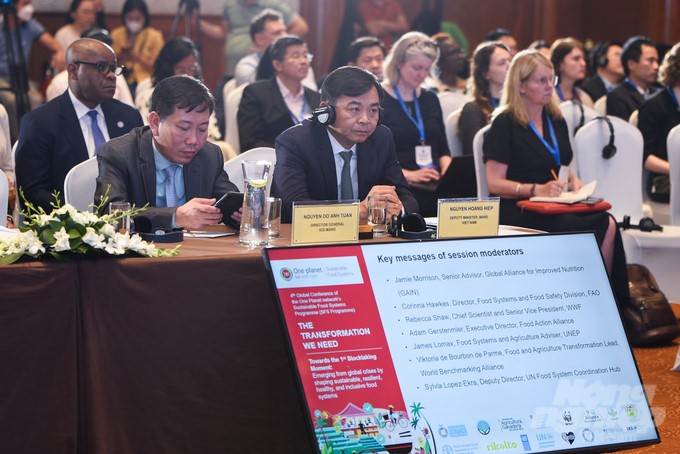
The closing session welcomed the participation of leaders of Vietnam's Ministry of Agriculture and Rural Development and a large number of international delegates. Photo: Tung Dinh.
At the fifth session on promoting the transformation through science, finance, human rights, and innovation, Mr. Adam Gerstenmier, Executive Director of the Food Action Alliance, emphasized the necessity of support to realize the partnership, which focuses on the stakeholder’s needs, while financial interest should be promoted to approach the riskiest subjects. This session paid more attention to scientific finance, but also called for more ideas on women's empowerment and ensuring gender equality in the food system.
The sixth session was organized with the theme "Strengthening the UN Food Systems Summit’s ecosystem of support: Mobilizing UNFSS coalitions to advance a food systems approach for more sustainable, resilient, and inclusive food systems". According to Ms. Rebecca Shaw, the session offered recommendations on responsible mechanisms for assessing the path to developing sustainable food systems in countries.
The WWF representative said that the construction of a sustainable food system requires the participation of many parties, so it is necessary to have specific databases to evaluate private and public investment. The evaluation work should be a process of continual improvement and responsibility, from which a process of maximum efficiency can be developed.
At the seventh discussion session with the theme "Measuring transformation", Mr. James Lomax, an expert from the United Nations Environment Program (UNEP), said, "We are discussing on building a sustainable food system in global countries, so difficulties are inevitable in each dialogue session. Therefore, in order to meet the established goals, countries, stakeholders, and delegates need to continue to have discussions and sit together to patiently find the optimal solutions for sustainable food system construction."
The eighth discussion session emphasized the role of connecting and leading the implementation of the countries’ action plans. According to Ms. Sylvia Ekra, Deputy Director of the Food Systems Coordination Hub, the national food system is a tool to carry out the mission of action plans on environment, nutrition, and food security.
Therefore, Ms. Sylvia Ekra deemed it necessary to have more national-level dialogues to continuously exchange paths and promote incentives in order to ensure that sectors and stakeholders can participate in the sustainable food system chain. It is also crucial to continue promoting the cooperation of partners and investors.
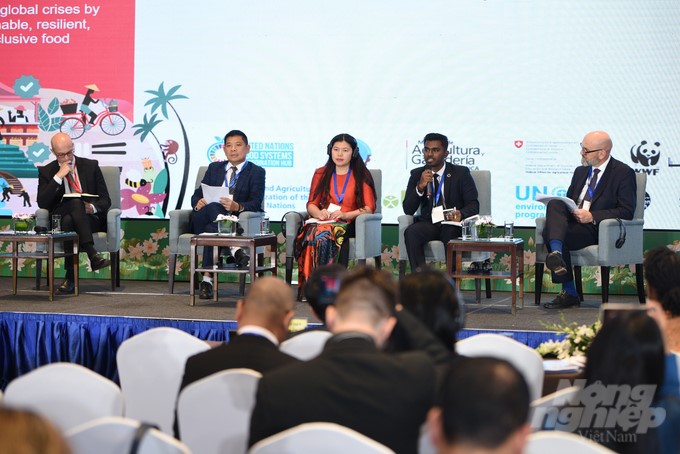
Delegates all said that building a sustainable food system require the involvement of all countries. Photo: Tung Dinh.
After listening to the messages from the discussion sessions, the representatives of the parties accompanying the Conference gave their opinions. Mr. Moghesh Sababathy, Co-Founder of the Project “Ocean of Hope”, highly appreciated the commitments of the delegates at the conference. Mr. Moghesh Sababathy expressed his wish that the young generation would continue to share their messages in the future. "Sometimes the young’s voices are not given due attention, but they are voices that should be heard. On behalf of the younger generation, I look forward to seeing the young generation's role in a sustainable future".
Mr. Moghesh Sababathy also said that countries need to solve the problem of a lack of connection between the government and localities due to the current situation where the young as well as the younger generation are no longer interested in agricultural production. Scientists and experts need to promote easier-to-understand media work so that the younger generation can understand the problems in the current food system. In further point of view, the young generation can contribute to the balance of three pillars: economy, society, and environment.
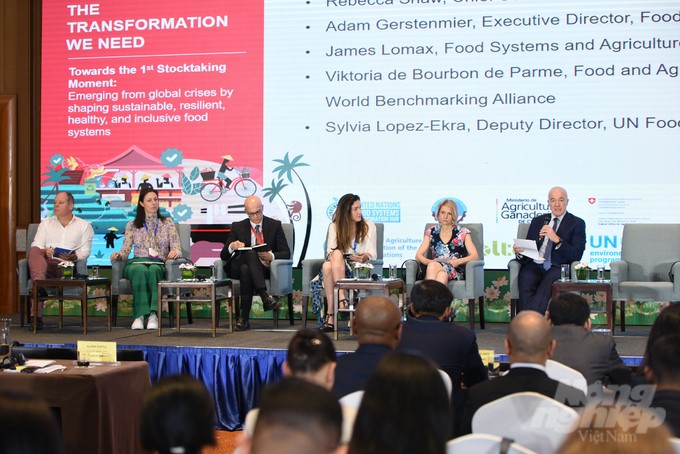
Since this conference, many initiatives and suggestions have been raised as a basis for countries to implement their actions. Photo: Tung Dinh.
Sharing about the common sentiment, Ms. Sylvia Ekra said that the fourth Global Conference on Sustainable Food Systems has inspired other countries to promote sustainable food systems. "The vision and messages presented at this conference can follow us to the "2023 UN Food Systems Stocktaking Moment, which will be held in Rome (Italy) in July".
Ms. Sylvia also conveys the message from words to actions. "Firstly, not only we listen to opinions but also need to verify action promises and commitments. Secondly, we should think about how to mobilize support, the connectivity and responsibility to replicate and mobilize resources, bringing benefits to everyone. Thirdly, it is necessary to promote the role of farmers so that they can contribute more to building a sustainable food system".
Translated by Huyen Vu
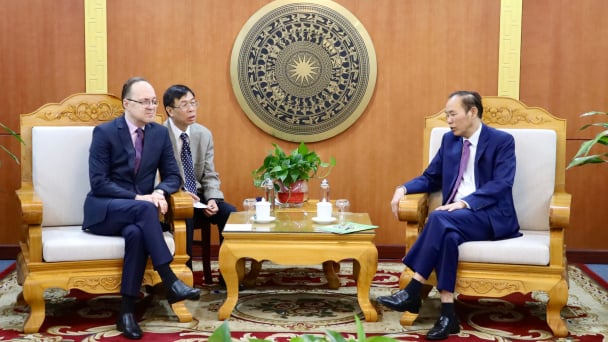
(VAN) On the morning of April 17, Deputy Minister of Agriculture and Environment Phung Duc Tien welcomed and worked with Mr. Gennady Bezdetko, Ambassador Extraordinary and Plenipotentiary of the Russian Federation to Vietnam.
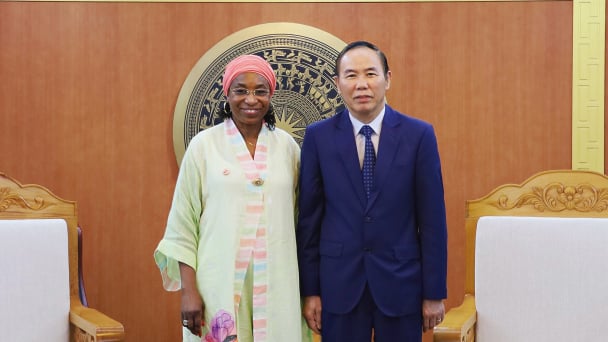
(VAN) On the afternoon of April 17, Deputy Minister of Agriculture and Environment Phung Duc Tien received with UNIDO Deputy Director-General Fatou Haidara.
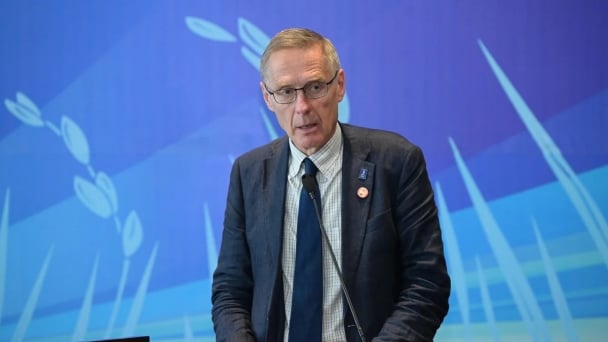
(VAN) The International Fund for Agricultural Development (IFAD) is proud to stand alongside the Ministry of Agriculture and Environment in the journey towards green transformation.
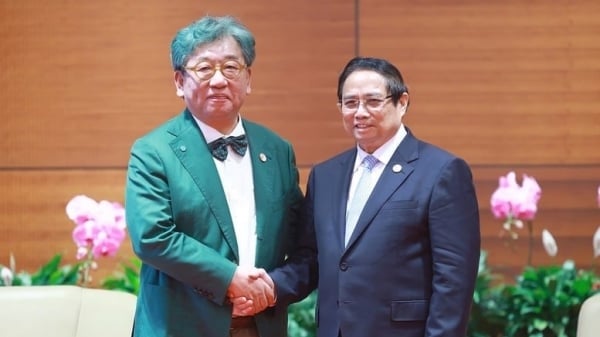
(VAN) GGGI commits to supporting stronger and closer cooperation between Vietnam and South Korea in the areas of green transition, information technology, agriculture and energy.
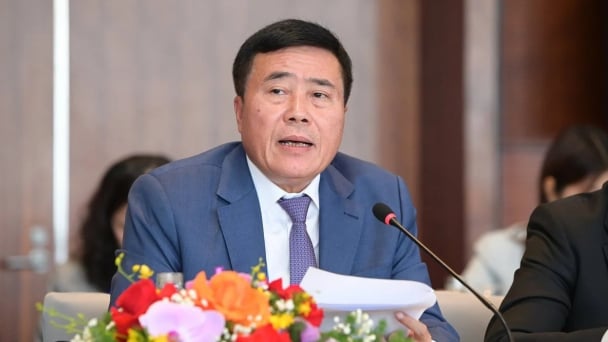
(VAN) Mr. Truong Sy Ba, Chairman of the Board of Directors of Tan Long Group, emphasized that future food security is not only about quantity, but also about being sufficient, appropriate, sustainable.
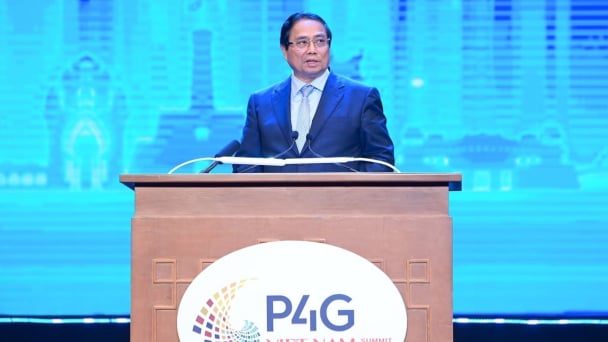
(VAN) Prime Minister Pham Minh Chinh sent a message of action and the principles of equal, fair, and responsible partnership in green growth at the opening ceremony of the P4G Summit.
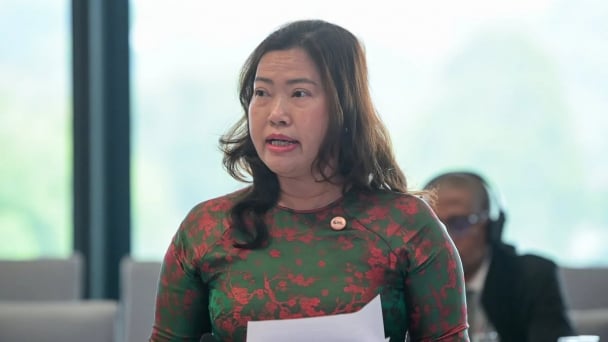
(VAN) Leaders of Can Tho city emphasize three solutions for transforming food system towards green, low-emission, and sustainable development at the P4G Summit.